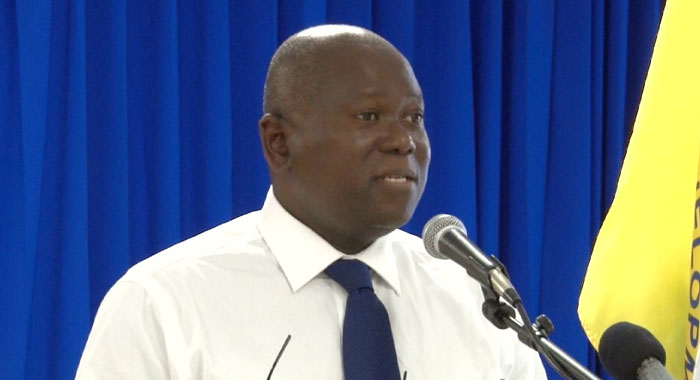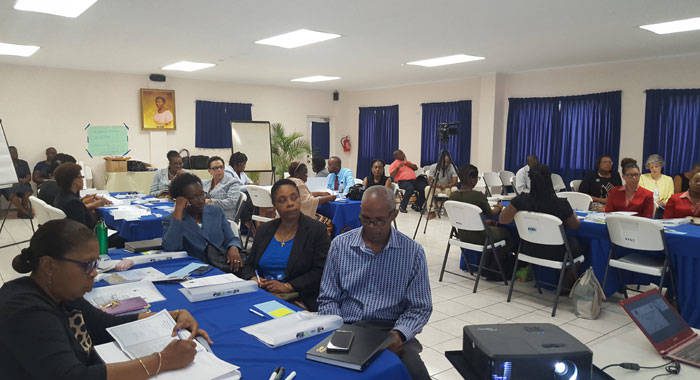Director General of Finance and Planning, Edmond Jackson on Monday registered his disappointment at the low turnout of targeted public officers at the Caribbean Development Bank (CDB’s) Public Policy Analysis and Management Training Programme.
“It is not always good to start with negatives but this is a negative that needs to be addressed here and now,” he told the opening ceremony of the workshop for permanent secretaries and heads of departments, organised in collaboration with the Government of St. Vincent and the Grenadines.
“One of the challenges that I have noticed in the public service generally is that we are sometimes too busy as heads of departments and permanent secretaries to invest in activities that can lead to transformation,” Jackson said.
He added that public officers must always make time for transformative activities because investing in these activities is what will shift their organisations, the public service and the country.
Based on feedback from CDB’s borrowing member countries, the CDB conducted a training needs analysis in 2013, which identified these areas for training.
The programme is, therefore, part of the wider transformation agenda driven by the CDB, to catalyse the change needed in the region to achieve the sustainable development goals by 2030.

The Director General of Finance and Planning pointed out that the government invests heavily in the enhancement of human capital but “training appears to be an activity in and for itself; it is not an activity that is seen as to allow us to make some changes”.
He added that many officers do not usually apply what they learn after these trainings.
“There is always a gap between knowing and doing, knowledge and performance,” Jackson said.
The told the workshop that the initiative by the CDB and the Government of SVG is a direct response to filling that gap.
He said the workshop was designed to meet the needs of the public sector and the trainees, to enhance effectiveness, to deliver better results for the organisations and the country, change organisational behaviour, to be transformative and sustainable.
He implored the participants to participate actively and to take what they learn to their organisations and departments to make a difference in SVG.
Meantime, the CDB’s Coordinator of Regional Cooperation and Integration, Andrea Power, said the CDB remains deeply committed to delivering sustainable development outcomes for the people of SVG.
She noted that the decision to develop and offer this training in public policy analysis and management training programme to SVG and CDB’s borrowing member countries is rooted in a deep appreciation of the very challenging development context of the region.
“In this region we remain constrained by low economic growth and high debt exasperated by eternal and environmental shocks. It is still costly to do business across the region and this in turn affects productivity and competitiveness,” Power said.
She further told the ceremony that reforming age-old administrative practices and improving human capital in the public service is not a simple and straightforward task and it requires a commitment to change a commitment to manage the change and it also requires financial resources.
“The Government of St. Vincent and the Grenadines boldly embarks on this complex mission with a number of partners including the World Bank and the UKFDI.”
Power pointed out that investing in public officers in this training exercise would help us to achieve a better alignment of projects with our national development plan and help to improve our implementation of infrastructure projects.
The face-to-face training will prompt participants to explore their own working practices and challenges through the use of case studies and scenarios as well as practical task based learning.
Participants will reflect on their own experience and the learning objectives of the session to develop a personal action plan that will guide their transfer of learning to their work settings.
The permanent secretaries and heads of departments are the first set of public officers to be engaged in the Public Policy Analysis and Management Training Programme.
Over the months of June and July, other levels and categories of public officers will also be trained in these areas.







It’s hard to know what to make of this. On the one hand, lots of these workshops and training sessions are a hopeless waste of time and money; on the other, if the government is so keen on sponsoring them and believe — based on hard evidence — that they actually make a difference in job performance, they should make them compulsory.
For example, there is lots of evidence from the teaching profession that teachers who have never had any formal teachers’ college training but are allowed to teach on other grounds are no better or worse in educating their students than teachers who have gained a Master of Education degree from a reputable teachers’ college. A common explantion is that “teachers are born, not made” meaning that some people have a natural gift of being able to inspire students to learn that no amount of formal education can instill. I suggest the same thing applies to government bureacurats.
The most successful Prime Minister in the Caribbean, based on years of continuous service, our very own Dr. Ralph Gonsalves, never took even one day of workshop training in how to be a successful politician before he was elected to his high office. Instead, every single day in the actual political trenches has been a learning day for him.
We, on this forum, used to discuss the excesses of government, the often sad state of the people’s affairs, what was done wrong or what was done well. Some of us actually invested a lot of time in picking apart the AIA project, some now resort to making footnotes to political pieces in support of the elite. Yes, we have lived to fight another day, to begin by making excuses, and in the same breath concluding with a resounding endorsement of the great Ralph Gonsalves. –What?–
, and Chance’s long-winded article which doesn’t offer any real point of view. Like, what is the real news here. (An otherwise-very-good article.)